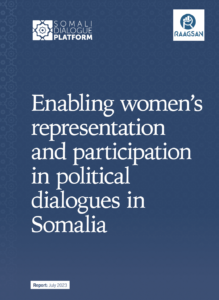SUMMARY
Somalia grapples with unique cultural, societal, and structural hurdles that hinder women’s access to political processes. Despite introducing a non-legally binding quota, the most recent federal elections in 2022 saw a decline in women’s parliamentary representation. Beyond this, women’s leadership in public spaces remains inadequate at all levels. Patriarchal norms, gender stereotypes, and cultural barriers hinder women’s full participation in decision-making, with women predominantly perceived as homemakers, with caregiving responsibilities. Even so, over the past decade, Somali women have been increasingly motivated to participate in politics, driven onward by their professional backgrounds, support networks, increased educational opportunities, and activism experience.
Against the above backdrop, this scoping study seeks to understand better the political barriers faced by women in Somalia and, in doing so find practical ways of increasing their political participation. The report also explores key findings and recommendations arising from the study.
This briefing is a product of the Somali Dialogue Platform in collaboration with Raagsan.The Somali Dialogue Platform is a programme which supports Somalis to achieve consensus on contentious political issues and is implemented by the Rift Valley Institute. The Somali Dialogue Platform is funded by the UK Foreign, Commonwealth and Development Office (FCDO), the Ministry of Foreign Affairs of Denmark, and the United States Agency for International Development (USAID).




